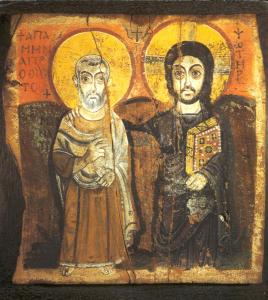
“As for the man who is weak in faith, welcome him, but not for disputes over opinions” (Rom. 14:1 RSV). We should be welcoming to everyone, including, and especially, fellow Christians. Not everyone, including fellow Christians, will be like us. They will have different views and opinions, different levels of understanding or faith than we do. Some will know and understand more, some less. Some will have greater faith, others, less. We should make sure those who are weak in faith do not become discouraged. We do this by making sure they feel welcomed and loved by us. They should not feel as if they are coming into hostile territory when they come to us.
We should show special care and concern with Christians who are experiencing some crisis in their faith. Just because they are weak in faith, or they are not as knowledgeable about its teachings as we are, does not mean we can ignore our responsibility towards them. We must show them, as with everyone else, as much love and respect as we can. This means, we should not go and confront them, questioning them about their faith. We must not engage any kind of emotional, psychological, or physical abuse towards them, justifying ourselves by saying we are showing them tough love. When we do this, we, more than likely, will push them further away from the faith, and if this happens, we will be held responsible.
We should be welcoming to others, full of love and charity, recognizing that we need to be humble, apologizing to them when we fail to meet them with the hospitality expected of us. This is how we are to show the world we are Christians, not by brow-beating others over doctrinal issues and debates. If we act as we should, we end up showing the world the love of Christ, as they will see it being reflected by us. We are not to hold it back. We are not to find excuses to deny people the love they should receive. We are to welcome them, not look for disputes. We are to welcome them, and this can be done in and should be done in a variety of ways, some of which includes the way we are when we are with them: ”One believes he may eat anything, while the weak man eats only vegetables. Let not him who eats despise him who abstains, and let not him who abstains pass judgment on him who eats; for God has welcomed him. Who are you to pass judgment on the servant of another? It is before his own master that he stands or falls. And he will be upheld, for the Master is able to make him stand” (Rom. 14:2-4 RSV).
The more welcoming we are, the more apologetic we are for the ways we might have needlessly offended them, the more we will show ourselves to be followers of Christ. We will be acting like him, for he was always ready to welcome others into his presence and show them love. He didn’t seek to get into dogmatic disputes with others, but if someone came to him, trying to challenge and debate him, he would consider the situation and respond to them with wisdom and with love. He would react in accordance to the context. Sometimes, he would find a way to praise the person who questioned him, using the good they already had to lift them out of their desire to challenge him, and in this way, draw them to him. With others, who were not so good natured, he took the challenge straight on, and he found a way to stump them, showing that he knew and understood what they were trying to do with the questions they brought to him. Instead of falling for the traps they wanted him to fall into, he led them back into their own trap. Even then, he was more than willing to welcome them, and he would do what he could to get them to change, to encourage them to move beyond their narrow thinking which kept them away from his love.
We should keep this in mind. The way we evangelize, if we want to use that term, is important. We should not treat others as objects of our will, as people we would like to control, using whatever manipulative tactics we can use to make them think like us. We certainly should not seek to turn people into mirror images of ourselves. When we do that, we show them that we don’t really love them. All we love is what we find in ourselves, and how we find what is in ourselves reflected in others. This will lead them to believe, perhaps with good reason due to their experience, that Christianity is merely a cult which turns people into clones of each other. That is because Christians have become cult-like in the way they evangelize, though they do not have to be, and indeed, should not be. This kind of evangelism is far from the kind shown by Christ. We are called to love others, to do what we can to help them in their needs, not to find a way to use them to help us in ours.
We should, however, be concerned about ourselves, and the ways we have caused others undue pain and sorrow. We should be concerned about how we have chased people away from us due to our own selfish desires and interests. We should be humble and apologetic when we have not acted as we should. We should recognize our own faults and try to find a way to overcome them instead of looking for the faults of others and use them to condemn them.
We should, therefore, go in the world, asking others for forgiveness. When we do that, we should be willing to forgive others if they ask for it. This, again, is how we show them our love. We must take down those barriers which separate us from each other, the barriers which hinder the love which we should have for each other. We are, after all, people with feeling; just as we have hurt others, others will hurt us. Just as we would like to be forgiven, we should also recognize others want to be forgiven. When everyone acts with a spirit of forgiving love, we can slowly overcome the barrier established by the hurt and pain we have experienced. Otherwise, if we don’t, there will remain some element of unlove in us, an unlove which not only puts up a barrier between us and those we do not forgive, but also between us and God. For God is love; when we embrace unlove, we turn ourselves away from God. This is why Jesus warned us, if we are not willing to forgive others when they are ready for it, we will find our own sins will not be forgiven. This is not because God is unwilling to forgive them, but because we remain attached to them by remaining attached to the root problem which created them, that is, our unlove. It is such unlove, such lack of charity, which keeps us distant from the God who is love: “ For if you forgive men their trespasses, your heavenly Father also will forgive you; but if you do not forgive men their trespasses, neither will your Father forgive your trespasses” (Matt. 5:14-15 RSV).
Forgiveness is not just one-way; it is two ways – both sides in a conflict need to be honest, and discern what, if anything, they did to create or make the situation worse. Even if, in the discernment in a particular situation, someone can honestly say they hold no fault, they should be able to see that they still hold fault in other situations, and if they would like to make peace in those situations, they must show the way forward by doing what they can to make peace with others. This doesn’t mean we should ignore justice and its expectations – but it means, when we truly work to fix a situation we made, or made worse, forgiveness will give us what we need to continue such work and to truly make restitution, even as it will help us change the system which created such injustices. We must, therefore, have a forgiving spirit. We must be willing to work with those who honestly seek to change their ways, so that whatever harm done to the common good, whatever harm which was done to the bonds which should connect us to each other, can be healed.
Stay in touch! Like A Little Bit of Nothing on Facebook.
If you liked what you read, please consider sharing it with your friends and family!
N.B.: While I read comments to moderate them, I rarely respond to them. If I don’t respond to your comment directly, don’t assume I am unthankful for it. I appreciate it. But I want readers to feel free to ask questions, and hopefully, dialogue with each other. I have shared what I wanted to say, though some responses will get a brief reply by me, or, if I find it interesting and something I can engage fully, as the foundation for another post. I have had many posts inspired or improved upon thanks to my readers.













